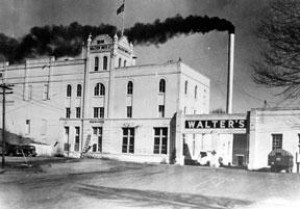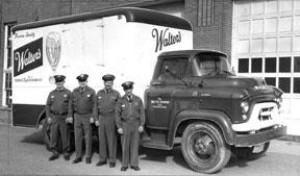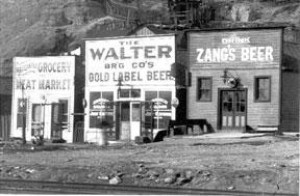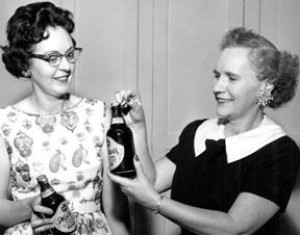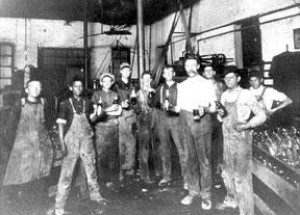Pueblo County, Colorado
Walter's Brewery

NOTICE All data and photos on this website are Copyrighted by Karen Mitchell. Duplication of this data or photos is strictly forbidden without legal written permission by the Copyright holder.
COURTESY PHOTO/JOHN SUHAY COLLECTION The Walter Brewing Co. plant is shown in this historic photo. Opening in 1898, the Pueblo brewery eventually sold beer under many labels. Among them were Pikes Peak, Berghoff 1837 Pale Extra Dry Beer, Gold Label and Walter's Bock.
CHIEFTAIN PHOTO/FILE City sales drivers (from left) Joe Bonfiglio, Louis Trontell, John Cernac and George Klasna pose beside a Walter's delivery truck.
COURTESY PHOTO/PUEBLO COUNTY HISTORICAL SOCIETY Pueblo's Kelly Street in the early 1900s is shown in this photo. Zang's was brewed in Denver.
CHIEFTAIN PHOTO/FILE Mrs. James Scott (right) shows Mrs. Robert Jackson how to open the zip top on a bottle of Walter's beer in this 1964 photo. The zip top was used on Walter's bottles in the late 1930s.
COURTESY PHOTO/PUEBLO COUNTY HISTORICAL SOCIETY The young bottle house crew poses with bottles of Walter's beer in 1909.
Pueblo Chieftain June 08, 2008 HOME BREW
Walter's quenched locals' thirst for three-quarters of a century
By Mary Jean Porter
Beer and Pueblo go way back.
The inaugural edition of The Colorado Chieftain, published June 1, 1868, notes that the Pueblo Brewery on Santa Fe Avenue, owned by Beshoar and Co., already was well-known in seven counties for its lager beer and cream ale. The brewery supplied thirsty soldiers at Fort Reynolds, Fort Lyon and Fort Garland as well as the beer drinkers of Pueblo, Trinidad, Animas City and Canon City, according to an ad offering it for lease in 1869.
Pueblo Brewery would change hands several times and other local breweries would be built before Walter Brewing Co. set up shop in 1898.
Walter Brewing operated at 1300 Hickory St. on the East Side until 1975. It closed during Prohibition but reopened in 1933 when happy days returned. In its heyday, 21 brands were distributed to 17 states, carrying labels such as Crystal Colorado Beer, Pikes Peak Ale and Sheridan Export Beer.
A new incarnation of the local brewery is planned for the Historic Arkansas Riverwalk of Pueblo. Co-owner Andy Sanchez said in a press release that the contractor hard-bid process is under way and the groundbreaking soon will follow. He said exclusive rights and permission have come from the Walter family to ensure the authenticity of the brewery's revival. A second brewery started on Santa Fe Avenue in about 1870 was short-lived. A third brewery was started in 1871 in an area bounded by Third and Fourth streets and Santa Fe and Albany avenues. This brewery also was called Pueblo Brewery and, in 1880, was relocated to south of the city, on the river. This new beer-making plant eventually became Walter Brewing Co.
Martin Walter, one of four brothers who emigrated from Germany to Wisconsin and started breweries there, came west in the late 1890s and visited Pueblo. He found a town "booming with the steel plant and three smelters going full blast." He returned home and announced to the family that he was buying the Pueblo Brewery, which he did on July 29, 1898, for $7,000. Martin's brother, Christen, was co-owner.
Retired Centennial High School teacher Robert Collyer, whose article on Walter Brewing Co. was published in 1999 in both The Pueblo Lore and American Breweriana Journal, said that Walter Brewing was an orphan at its East Side location.
"In the late 1800s, 10 to 15 breweries or their representatives were located in the Grove or near Union Avenue. Intermittently, several saloons that made their own (beer) appeared on lower Santa Fe Avenue. Walter's was located on the north side of the tracks, 2 miles southeast of the post office," Collyer's article stated.
He wrote that Walter Brewing got its water from Fountain Creek, through the Goldsmith Ditch. Ponds at the site were filled by the ditch and ice was cut from them in winter when they froze.
Collyer said he became interested in the history of Walter Brewing when out-of-town visitors came to the Pueblo County Historical Society's former library at Hotel Vail seeking information.
"John (Korber) and I were at the Vail that day and I took them out to the site of the brewery and walked them around," Collyer said.
Korber said Pueblo always has been a beer-drinking community and Walter Brewing was an important business here. He's compiled a file of clippings about the brewer that illustrates the good press given the beer-maker by the Chieftain.
"The beer is remarkable for its richness of flavor and brilliancy. It is pure, wholesome, palatable, pleasing to the eye and generally stimulating and invigorating. The Walter Brewing company are producing a beverage that has struck a responsive chord in the hearts of the people," stated the Jan. 20, 1899, Chieftain.
The first Walter Brewing product was called Mountain Dew, though the name was changed to Gold Label in 1915. The early plant consisted of a two-story cellar and adjoining brew house, malt storage room and boiler room. The cellar was increased in size in 1902 and a new modern brew house was built, which increased capacity to 170 barrels from 45 barrels. Walter Brewing expanded again in 1909, though at the end of the year it closed the saloon that had operated on the grounds.
The early bottle-washing process consisted of soaking the bottles in hot water, then filling them with hot water and buckshot and shaking them to finish the job. The bottles were half-pints or "splits," and were corked with a seal made of a rubber product that was forced into the neck. When it was time to drink the beer, a pointed opener, an ice pick or even a nail could be used to pry off the seal.
At the beginning, there were no paper labels - the name was molded into the bottles - and beer was not pasteurized. When the modern brew house was built in 1902, the bottles were washed, pressure-filled and capped and the bottled beer was then pasteurized in large wooden tanks. Labels were added by machine.
Beer canning machinery was added to the plant in 1948.
Puebloans John Sackman, Andy Sackman and Edmund Koller gained control of the company in 1963 and it ceased being family owned, though the Walter name was kept. A large block of stock also fell into the hands of Paul Kalmanovitz and by the end of the 1960s, his General Brewing Corp. owned 80 percent of the stock.
In 1964, the Walter Brewing Company's 75th anniversary, the Pueblo-based beer was sold across Colorado and in Arizona, Arkansas, California, Iowa, Kansas, Missouri, Nebraska, New Mexico, Oklahoma, South Dakota, Texas, Utah and Wyoming, under a dozen labels: Hynne, Pikes Peak, Hoffman House, Walter's, Wellington, Berghoff 1837, Sheridan, Gold Label, Metz, Walter's Bock, My, and Wellington Stout.
At that time, Walter was one of only three breweries in Colorado, according to a special 75th anniversary section devoted to the brewery that was published in the May 17, 1964, Pueblo Star-Journal and Sunday Chieftain. (The company dates to 1889 when brothers Martin and Christen Walter bought a brewery in Menasha, Wis.)
A decade later, 1974, output had fallen to 60,000 barrels a year and the names of other breweries acquired by Kalmanovitz began to appear on labels and cans coming from the Pueblo plant.
Walter Brewing Co. closed its doors Jan. 3, 1975. The plant's old giant kettle became a display item at the Brewery Mall in Salt Lake City. Other items - including an 111-foot-tall smokestack - were auctioned.
The plant was razed in 1987.
Sources: Pueblo Star-Journal and Sunday Chieftain; "The Walter Brewing Co.," by Robert Collyer, published in Pueblo County Historical Society's Pueblo Lore, January 1999

THE PUEBLO CHIEFTAIN October 17, 2008
Plans for new Walter's Brewery stall out -
Without completely giving up on it, the Urban Renewal Authority is asking for other ideas for the space.
By Jeff Tucker
The Urban Renewal Authority of Pueblo hasn't given up completely on the Walter's Brewery project on the Historic Arkansas Riverwalk of Pueblo. But it is ready to solicit other ideas if there are any out there.
The authority voted unanimously Tuesday to send out a new request for qualifications for HARP Lot 4, after the developers of Walter's Brew Pub fell nearly a year behind schedule.
"We're still very much interested in their project and we want them to succeed," said authority Executive Director Michael Tedesco. "But at this point they're nearly a year past when construction was supposed to start."
Andy Sanchez and Bret Bezona had plans to build a restaurant and microbrewery on the lot next to what is now Angelo's Pizza on the Riverwalk.
They planned to use the original recipe for Walter's Beer, a Pueblo brand from years ago, as a cornerstone for the business. But progress has been slow since the business plan first was announced in February 2007. Now, the authority will send out requests for qualifications for any developer for Lot 4, including Sanchez and Bezona.
"If it turns out that their finances and construction (are complete) by the time they respond to the RFQ, it is very likely, probably certain, that they will be selected," Tedesco said. "But the board also is curious to see if there is other interest out there."
Securing financing for any project could be difficult these days. Credit markets have tightened because of the economic crisis on Wall Street and Tedesco said financing a project in this climate could be a challenge.
"The degree of likelihood that a developer will have to bring his own resources to the table is high, which means any developer is going to have some pretty deep pockets right now," Tedesco said.
Authority board chairman Gary Trujillo said Sanchez and Bezona told the board they could not secure a loan from a bank because of the market.
Trujillo said the absence of any development of Lot 4 is a concern for the board.
The authority has the roughly $30,000 in tax-increment financing generated from development planned to pay off its share of the Main Street Parking garage.
Tax-increment financing is generated by skimming extra taxes on properties within urban renewal areas that have been improved.
The authority has an agreement with the city in which the city will pay whatever shortfall the authority has in paying its portion of the garage.
Trujillo said the absence of development on Lot 4 could contribute to the authority's shortfall, but he said the board was able to refinance the loans for the garage, so the annual payments on the structure are less than originally anticipated.
Sanchez could not be reached Wednesday for comment.


to the Pueblo County Index Page.

Please e-mail comments and suggestions to
Karen Mitchell
| © Karen Mitchell |


